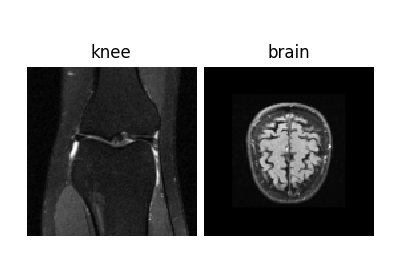CMRxReconSliceDataset#
- class deepinv.datasets.CMRxReconSliceDataset(root, data_dir='SingleCoil/Cine/TrainingSet/FullSample', load_metadata_from_cache=False, save_metadata_to_cache=False, metadata_cache_file='dataset_cache.pkl', apply_mask=True, mask_dir='SingleCoil/Cine/TrainingSet/AccFactor04', mask_generator=None, transform=None, pad_size=(512, 256), noise_model=None)[source]#
Bases:
FastMRISliceDataset,MRIMixinCMRxRecon dynamic MRI dataset.
Wrapper for dynamic 2D+t MRI dataset from the CMRxRecon 2023 challenge.
The dataset returns sequences of long axis (
lax) views and short axis (sax) slices along with 2D+t acceleration masks.Return tuples
(x, y)of target (ground truth) and kspace (measurements).Optionally apply mask to measurements to get undersampled measurements. Then the dataset returns tuples
(x, y, params)whereparamsis a dict{'mask': mask}. This can be directly used withdeepinv.Trainerto train with undersampled measurements. If masks are present in the data folders (in file formatcine_xax_mask.mat) then these will be loaded. If not, unique masks will be generated using amask_generator, for exampledeepinv.physics.generator.RandomMaskGenerator.While the usual workflow in deepinv is for the dataset to return only ground truth
xand the user generates a measurement dataset usingdeepinv.datasets.generate_dataset(), here we compute the measurements inside the dataset (and return a tripletx, y, paramswhereparamscontains the mask) because of the variable size of the data before padding, in line with the original CMRxRecon code.Note
The data returned is directly compatible with
deepinv.physics.DynamicMRI. See Tour of MRI functionality in DeepInverse for example using this dataset.We provide one single downloadable demo sample, see example below on how to use this. Otherwise, download the full dataset from the challenge website.
Raw data file structure:
root_dir --- data_dir --- P001 --- cine_lax.mat | | | | | -- cine_sax.mat | -- PXXX -- mask_dir --- P001 --- cine_lax_mask.mat | | | -- cine_sax_mask.mat -- PXXX
Example:
>>> from deepinv.datasets import CMRxReconSliceDataset, download_archive >>> from deepinv.utils import get_image_url, get_data_home >>> from torch.utils.data import DataLoader >>> download_archive( ... get_image_url("CMRxRecon.zip"), ... get_data_home() / "CMRxRecon.zip", ... extract=True, ... ) >>> dataset = CMRxReconSliceDataset(get_data_home() / "CMRxRecon") >>> x, y, params = next(iter(DataLoader(dataset))) >>> x.shape # (B, C, T, H, W) torch.Size([1, 2, 12, 512, 256]) >>> y.shape # (B, C, T, H, W) torch.Size([1, 2, 12, 512, 256]) >>> 1 / params["mask"].mean() # Approx 4x acceleration tensor(4.2402)
- Parameters:
root (str, pathlib.Path) – path for dataset root folder.
data_dir (str, pathlib.Path) – directory containing target (ground truth) data, defaults to ‘SingleCoil/Cine/TrainingSet/FullSample’ which is default CMRxRecon folder structure
load_metadata_from_cache (bool) – _description_, defaults to False
save_metadata_to_cache (bool) – _description_, defaults to False
metadata_cache_file (str, pathlib.Path) – _description_, defaults to “dataset_cache.pkl”
apply_mask (bool) – if
True, mask is applied to subsample the kspace using a mask either loaded fromdata_folderor generated usingmask_generator. IfFalse, the mask of ones is used.mask_dir (str, pathlib.Path) – dataset folder containing predefined acceleration masks. Defaults to the 4x acc. mask folder according to the CMRxRecon folder structure. To use masks,
apply_maskmust beTrue.mask_generator (deepinv.physics.generator.BaseMaskGenerator) – optional mask generator to randomly generate acceleration masks to apply to unpadded kspace. If specified,
mask_dirmust beNoneandapply_maskmust beTrue.transform (Callable) – optional transform to apply to the target image sequences before padding or physics is applied.
pad_size (tuple) – tuple of 2 ints (W, H) for all images to be padded to, if
None, no padding.noise_model (deepinv.physics.NoiseModel) – optional noise model to apply to unpadded kspace.


